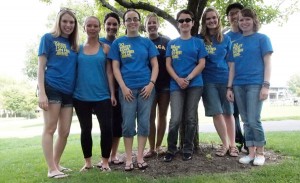Two years ago, I sat in a funeral parlor and witnessed the private memorial for the son of my mother’s friend. The room was stuffy on that hot July day and packed with people, young and old. While I didn’t recognize many of the faces surrounding me, something was familiar. The pain I saw on each face was the same. The loss was shared. This young life cut short was the cause of this mutual grief. They were all survivors of suicide.

Fast forward to today. The family of this young man is still struggling to recover from the massive loss. His sister refuses to talk about her brother or even mention his name. His father will not talk about the suicide, but pushes his feelings and fears deeper and deeper. His parents’ marriage has suffered, and his sister’s wedding date continues to delay. The inability to talk about the suicide has kept their lives on hold.
Suicide. It’s a curse word in today’s vocabulary — a topic that some people never mention or even acknowledge. Our society pretends the issue doesn’t exist. In turn, we silence important conversations about suicide and depression.
But suicide is a serious reality. More than 36,000 people in the United States take their own lives every year. Suicide is the third leading cause of death for people between the ages of 15 and 24, according to the American Foundation for Suicide Prevention. Every 15 minutes, someone dies because of suicide. Maybe this is a conversation we should be having: If suicide happens so often, then why is it so taboo? Why is our society so ashamed to talk about it?
Conversations about suicide and depression open up some of our greatest fears, darkest secrets and deepest wounds. We shrink back from these conversations, afraid to expose our vulnerable sides and to admit our fears. But reaching out despite our vulnerabilities, fears or pain makes us stronger. These conversations can help save lives.
We forget that we are all human and that we all have apprehensions and faults. Not one of us is perfect. Not one of us fits a standard mold. That’s what makes the human race so beautiful: our differences, our similarities, our complexities and our oddities. Yet in times of trouble and crisis, we forget that we are all capable of fear and of feeling alone. We shut the world out instead of reaching out for help.

“We can do no great things, only small things with great love,” Mother Theresa once said. Love is the greatest power we possess. We depend on love, thrive on love and live for love. In little daily actions, we can share love with those around us — sharing a laugh, hugging a parent or listening to a friend in need.
We all have the ability to reach out to one another, to remind one another we’re not alone. Our life journeys are not individual paths — they’re filled with highs and lows, unexpected twists and turns. Most importantly, they’re intertwined. We don’t go through life alone. There is always hope and help. Your journey doesn’t end here.
Reaching out for help in a time of need is one of the strongest moves anyone can make. Remember, help is always available.
Students can visit the Center for Counseling and Psychological Services located on the lower level of the Hammond Health Center or call the Suicide Prevention and Crisis Services at 272-1616.
Meghan Rindfleisch is a senior journalism major. Email her at [email protected]







